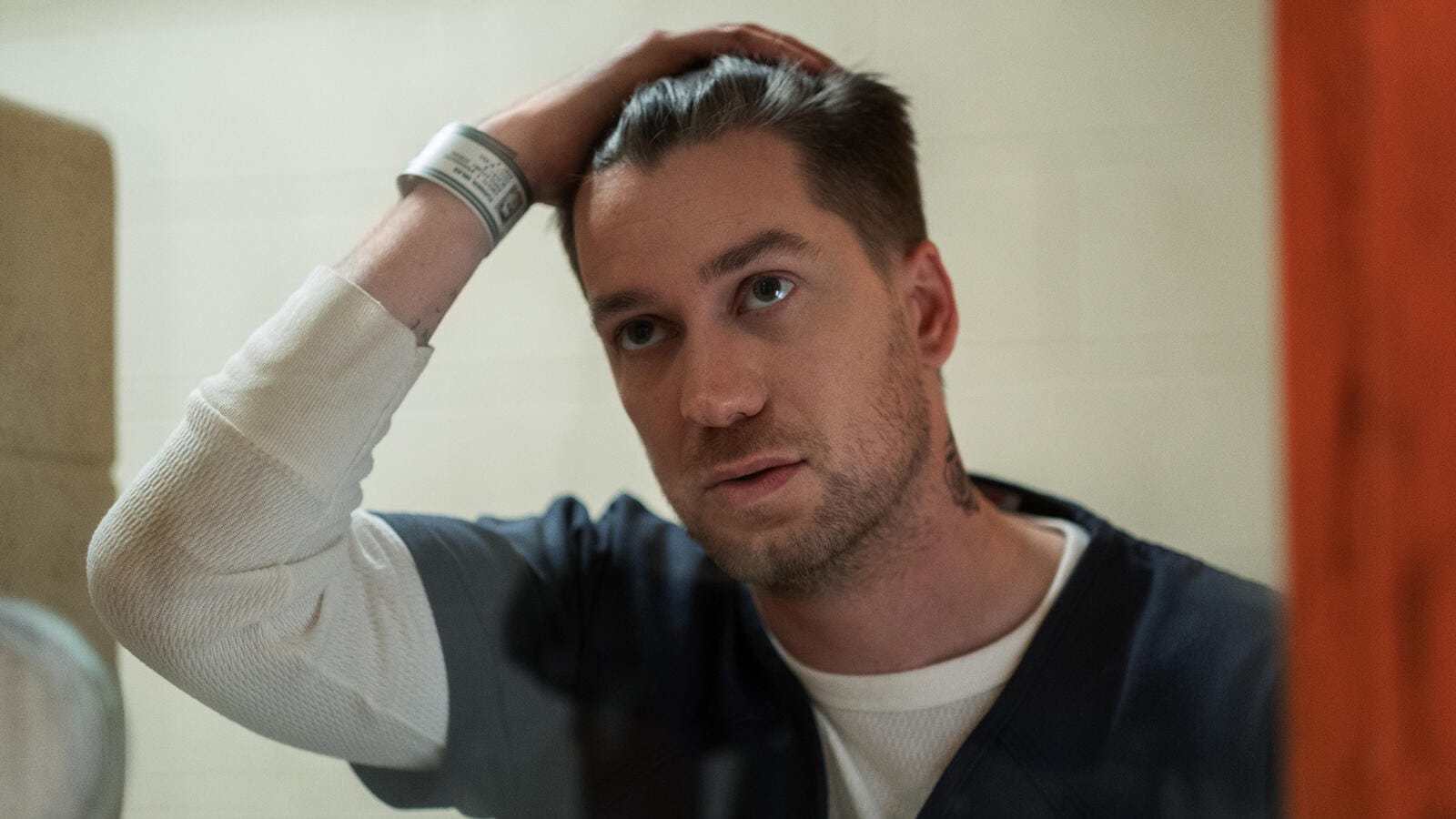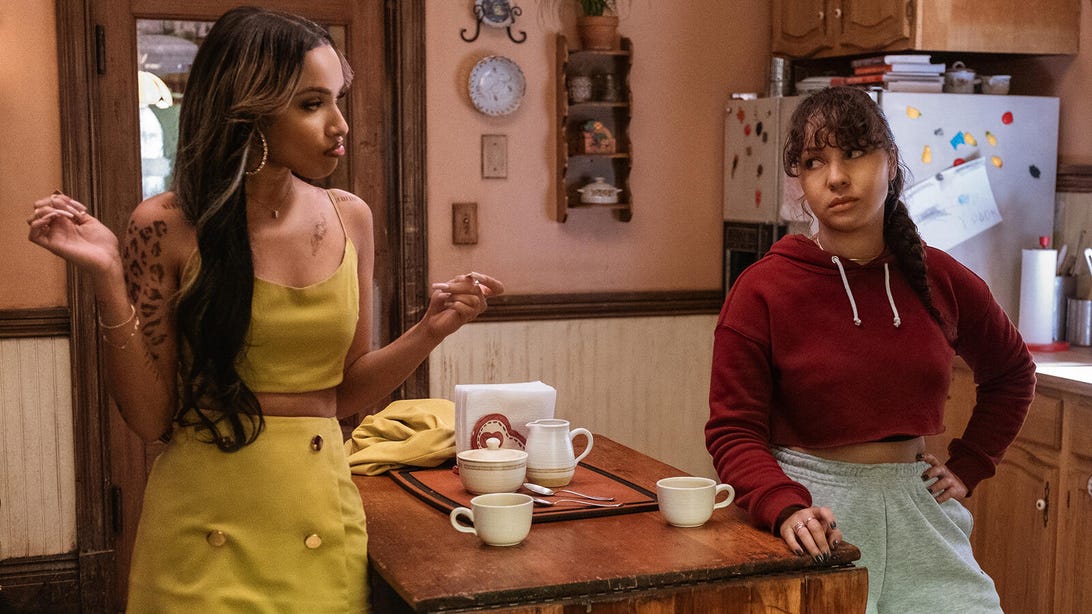Join or Sign In
Sign in to customize your TV listings
By joining TV Guide, you agree to our Terms of Use and acknowledge the data practices in our Privacy Policy.
Rafael Casal Reveals How the World of Blindspotting Expanded for Genre-Defying New Starz Series
'We're completely in love with the show and we can't wait for everyone to see it.'
It took more than 10 years for Rafael Casal and Daveed Diggs to make Blindspotting, the intensely underrated 2018 film about two Bay Area best friends whose friendship hits the rocks when one of them witnesses a police shooting with only three days left on his parole. With Casal and Diggs both having multi-disciplinary backgrounds in poetry, hip-hop, and music production, Blindspotting was a commentary on the prison industrial complex that embedded heightened language and verse into the narrative in intriguing new ways. While the film was critically acclaimed and performed well on the festival circuit, it largely flew under the radar for mainstream movie viewers.
Now the duo has reteamed with Blindspotting film producers Keith and Jess Wu Calder, Lionsgate, and added Starz into the mix to bring the world of Blindspotting to the small screen. Instead of focusing on Miles (Casal) and Colin (Diggs) though, the eight-episode series will center on Ashley (Jasmine Cephas-Jones), Miles' girlfriend and mother to their young son Shawn.
"We didn't want to do the show. We were really opposed to the idea," Casal told TV Guide ahead of the show's Sunday premiere. "I remember Lionsgate was like 'I think we should make a TV show.' and we were like, 'I don't think we should. I think it's already been done.' It's because we were thinking, Miles and Collin longer story. What are we going to talk about with the two of them? [The movie] was the most interesting three days of their lives, but we went into a meeting because Lionsgate are friends of ours and main collaborators. We took the meeting and were like, 'Look, we only want to do it if we could have it be all about Ashley. That's the character we actually wanted more from in the movie,' and they were really on board with that."
The 50 Best Movies and TV Shows You Can Watch on Amazon Prime Video Right Now
The show picks up several months after the events of the movie with Colin and Ashley doing pretty well for themselves until Colin gets arrested for drug possession. Without a partner and a second income, Ashley is forced to move in with Miles' mom Rainey (Helen Hunt) and his half-sister Trish (Jaylen Barron) to figure out her next steps. As the season progresses, we not only learn more about Ashley but also meet new characters that represent different facets of the Bay Area where Casal and Diggs were raised.
"The more and more we sort of pitched ideas for the show, the more they were down for the plan. We sort of talked ourselves into it while trying to talk ourselves out of it. And then we were really excited that Jasmine, who was one of our favorite actors, would get to flex in this way -- could do verse and movement and could carry this," Casal explained. "The lead of the show would be a character that we could build off of, and introduce a whole new cast of people that we really, really love. So suddenly we were like, 'Well actually, maybe that movie was for us to be able to build a show around it. Now we're completely in love with the show and we can't wait for everyone to see it."
The show, like the movie, is still largely a commentary on the prison industrial complex. Colin is the one most directly interacting with the court system in the movie as he's on parole after getting out of prison on assault charges. The show will see Miles fed into the pipeline and delve further into how the complex affects an entire community of people and as a whole is not working for the society it is meant to protect.
"The system of incarceration is attacking Black and Brown people at a disproportionate rate, but it is terrible for all poor people. It is a system that in this country is just out of control. The things that people go to prison for and the durations that they stay has made us like a country based around sin, in a way that nowhere else is. It didn't feel strange for us at all for Miles to get thrown in jail for far too long, because we've watched it happen to our friends," Casal said.

Rafael Casal, Blindspotting
StarzWith more time to tell the story, not only can the creative team have more conversations about complex topics but there was also more room to explore different storytelling methods. Choreography becomes a much larger piece of the heightened language used within the show, along with poetry confessionals and rap verses. Part of what drove the excitement for the TV version of Blindspotting after the initial hesitation for Casal was being able to drive right into these artistic expressions without having to explain to the audience exactly what was happening.
"The audience for TV is ready for extreme conventions right off the bat, and so we just skipped to the end and got right into like, 'Yo, Jasmine doesn't have an ally in this movie right away, as her person to relate to is the audience.' She can condense the way that she's feeling inside into poetic language for an audience better than she can communicate with Rainey or Trish or Janelle," he said. "We've seen people, candidly, talk to the audience to like have a frank moment, but we haven't seen anyone give a heightened diverse moment to the audience as a way to talk about something that's a very complex emotion in a very short amount of time. That felt like our new take on what does it mean to speak directly to an audience. We leaned into that really heavily."
Meanwhile, choreographers Lil Buck and Jon Boogz act directly as or lead the troupe in front of the camera like a Greek chorus, consistently stepping in to represent "The System" even if Ashley or Miles aren't directly talking about their current situation.
11 Underrated Musicals To Watch After In The Heights
"We want a Greek chorus that also means something for Ashley's trajectory. We decided that this chorus of dancers was going to be sort of the outer reaching arm of the prison industrial complex into day-to-day life. And so they appear anytime that the system that Ashley is not directly incarcerated into is still affecting the way that she watched the world, and subsequently affecting the way that a ton of other characters do. We play a lot with who can see them, when they can see them, and what they're doing," Casal revealed. "Then we lean really heavily on local dance styles from the Bay Area, to be sort of the base for how they move so that it stays really specific to the Bay."
The Bay Area is like its own character within the Blindspotting narrative. Casal in interviews and on social media talks a lot about being "loyal to the soil," and both this series and the movie are love letters to his hometown. However, he doesn't have enough ego to think that either of the works are the definitive Bay Area story. In fact, the producer hopes Blindspotting is merely an inspiration for more Bay Area artists to take the mic and deliver their own homage to the vibrant NorCal enclave.
"Instead of trying to tell like the Bay Area story or the Oakland story, which is impossible and is not what the show will ever be able to do, just tell one really well, and hopefully enough that people love it. [Then] other great storytellers from that area can tell a totally different one. And then we start to have this like multiverse of stories like New York has, you know where like other big cities have where there's a million New York stories [and] they're all so different. Everyone sees that city so differently," he said. "I think I would love to feel that way about Bay Area storytellers."
In the meantime, Blindspotting premieres Sunday, June 13 on Starz.

Jaylen Barron and Jasmine Cephas Jones, Blindspotting
Starz